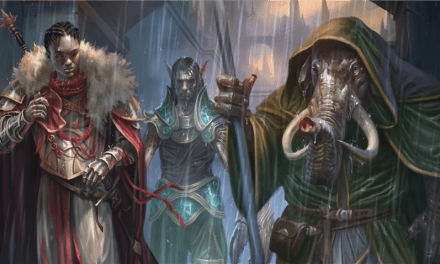It’s a little ironic, isn’t it? Of all the monsters and challenges to be overcome in a game of Dungeons & Dragons, there’s one, in particular, that is especially terrifying.
It’s so terrifying that few will acknowledge it and even fewer will say its name…
But it’s time for us to do just that!
Today we’re taking a step back to talk about Imposter Syndrome as a Dungeon Master. We’re going to look at what it is, how it manifests, and what you can do as a DM to conquer it.
It’s worth pointing out that I’m not a doctor, so this is primarily just my own personal experience dealing with Imposter Syndrome in my own D&D games.
What Is Imposter Syndrome?
These days, it seems like countless people experience Imposter Syndrome even if they don’t know its name.
Imposter Syndrome is that feeling where you feel like a fraud even if you’re doing everything right. It’s a fear in the back of your mind that someone is going to find out the “truth” and expose you for who you “really are.”
Sometimes Imposter Syndrome manifests as feeling unqualified or undeserving of your role (even when it’s obvious you’re not). Other times Imposter Syndrome can make you feel like a failure, even if your successes are clear to everyone around you.
In other words, Imposter Syndrome is a feeling of self-doubt and insecurity in your abilities, no matter how great they actually are.
Imposter Syndrome can be experienced by anyone in any field. Dungeon Masters are no exception!
As Dungeon Masters, we are not immune to Imposter Syndrome. We might feel like we’re faking it or that our players know more about the game than we do.
Whether you’re new to the DM’s chair or if you’ve been your group’s DM for years, these little doubts can creep in all the same.
This might make you hesitant to take risks and try new things in your D&D game. You worry that you’ll look like you don’t know what you’re doing and that your players will be disappointed.
Even when everything’s going great and your group is having fun, Imposter Syndrome can make you feel like a fraud.
How Imposter Syndrome Impacts Dungeon Masters
Dungeon masters are a unique bunch.
We’re the ones who get to create worlds, guide our groups’ stories, and take on all of the roles needed to bring the game world to life – but Imposter Syndrome may be holding us back from fulfilling our full potential as DMs!
Imposter Syndrome makes you feel like you don’t deserve the responsibility of being a Dungeon Master. It can make you avoid taking risks or trying new things for fear that your group will see right through it and realize what a fraud you are.
That’s what those little voices of doubt say anyway.
Dungeon Masters who struggle with Imposter Syndrome might even feel so overwhelmed that they avoid being a Dungeon Master altogether. This self-doubt can make you feel like it’s simply not worth the risk.
Too often, a Dungeon Master might have a great idea for their game but Imposter Syndrome can make them believe that they’re not qualified to run it.
DMing is an opportunity to try new things to make your games memorable, iconic, and fun for your group. It’s exciting until you start to feel that doubt creeping in…
Fortunately, it’s possible to overcome this!
How to Overcome Imposter Syndrome as a Dungeon Master
Even after all these years, Imposter Syndrome still hits me from time to time. It can be paralyzing… but luckily, there are steps we can take.
The good news is Imposter Syndrome doesn’t have to hold us back as Dungeon Masters. At the end of the day, it’s an irrational fear and can be overcome with some simple steps and reminders!
Step 1 – Mindset
First things first, take a deep breath and clear your mind. The goal here is to shut out the noise, recognize the feelings of doubt that you’re having, and align your mindset.
This might take you 30 seconds or it might take you 10+ minutes. Find a place with no distractions to simply meditate and reflect before the game.
Remember that your players aren’t against you. They want you to succeed as a Dungeon Master just as surely as you want them to be amazing players!
In a way, the fact that you’re having these feelings of Imposter Syndrome is kind of a good thing! While the anxiety it creates isn’t so good, it does mean that you really care about your group’s experience.
Caring about your group having a fantastic game is such an important thing. Realizing that this feeling of doubt is coming from your desire to create an unforgettable D&D game helps you put these feelings in context.
Take a deep breath and visualize what elements of your upcoming session are likely to appeal to each player. If you’re engaging them, they’re almost certainly having fun.
Related: 9 Powerful Tips to Engage Players in Your D&D Game
Above all else, keep the main objective of having fun in mind.
Before every session I run, I will personally spend about 15-20 minutes doing this!
Step 2 – Self Inventory
Recognize the skills that you already have!
There isn’t one single “best” way to be a Dungeon Master. What works great for one group might be terrible for another.
Some DMs might be incredible at preparing and building perfectly balanced games but have difficulty adapting to things that happen beyond what they’ve planned for. Others might be excellent actors with the ability to bring each and every NPC to life but have difficulty lining out a cohesive adventure plot.
Try not to compare yourself to other well-known DMs too much. You can learn from them, but at the end of the day, they’re the DM for THEIR group. Trying to be exactly like Matt Mercer from Critical Role, for example, denies your own strengths and might not necessarily be what your group wants or needs.
Related: Your Game Won’t Be Like Critical Role (And That’s A Good Thing!)
Be honest with yourself about what skills you bring to the table. Play to those strengths in your DMing style.
From there, look at what some other skills are that would improve your ability to be a great DM. Are these skills that you could reasonably start learning?
Playing to your strengths and meeting what your players hope to get out of the game keeps the ball in your court, so to speak.
Step 3 – Develop New Skills
Branching off of the last point, look at what skills you can develop to add to your games.
If your group enjoys lots of roleplaying, you might experiment with trying new character voices. For a group that likes props and exploring a wide-open game world, you might start learning how to make maps.
Whether you’ve been DMing for 30 years or 30 minutes, keep yourself open to new ideas, concepts, and techniques.
Considering how popular Dungeons & Dragons is these days, there’s a ton of incredibly helpful information out there now to really refine your DM skillset!
I’d strongly recommend that you check out my list of the top 6 books that every DM should read. These aren’t all explicitly about D&D, but they’ve formed the backbone of my own DM skillset for some time now!
Step 4 – Take Risks and Roll With Mistakes
Everyone is going to make mistakes. It’s not the end of the world and, in many cases, your players probably won’t even notice if you mess up something. Just roll with it!
So experiment with taking risks and don’t be afraid of making mistakes!
If (or rather WHEN) you make mistakes, learn from them!
Imposter Syndrome is closely tied to self-sabotage, and the fear of failure in general, so it can be curbed by learning from past mistakes.
Maybe you made an encounter too deadly or didn’t play an NPC exactly how they’re written in the adventure you’re running. Understand that this is coming from a place of caring when I say to you: “so what?”
Adaptability is key to running a D&D game. Keep rolling with it and find ways to make your “mistake” into something that adds to the story.
Not every encounter is winnable and that unbalanced encounter might just be a great way to introduce the players to the next big antagonist. Now they have personal reasons to want revenge!
That NPC that you didn’t play “correctly” might now become something much more in your group’s game. Countless other groups have played any given published adventure, but this is a point where your group’s story is entirely unique!
Find ways to make it work then take the time after the game to review what happened and figure out where the story can go from here. Even in the worst situations (like if you’re approaching an accidental TPK), you can usually find some kind of reason why it’s not the end of the story.
Mistakes are good and provide learning experiences for us as DMs. Just don’t let it turn into a spiral of endless self-criticism!
Step 5 – Get Feedback
Generally, you’ll be able to tell if your group is enjoying the game, but it’s always nice to have confirmation.
Get feedback from your friends on how you’re doing as DM.
Asking questions after the game like “so what did you all think of that encounter?” can be a great way to get your players’ thoughts and calm down any fears you might be having.
This is especially useful if you’re trying something new in an encounter. Maybe you had the enemies using some clever tactics or you worked some puzzles into the dungeon that they’re exploring.
Confide in your group! They are very likely to be supportive and understanding. Being a DM is hard work and they almost certainly will recognize that.
Don’t shut down any constructive criticism or take it personally. Instead, use that to inform how you’re running the game going forward!
Remember: you’re all there to have fun!
Focus on what you’re players are enjoying and give yourself credit for small accomplishments. As long as you incorporate their feedback into your DM style, they’ll have a blast!
Step 6 – Keep a Journal
For the final step: keep a journal.
I’d say this step is optional for most Dungeon Masters who have at least a couple of years of experience running the game.
However, for newer DMs (especially those who are struggling with Imposter Syndrome), this is very important.
Take time after each game to reflect and write down what went well and what could be improved. If you noticed certain players engaging more in certain situations, you might take note of that too.
You want to make notes about each session while the events of the game are still fresh on your mind. Later, you’ll have notes to reference when you’re planning out the next game session.
Generally, I personally focus on 4 major points for my notes after each session:
- What went over well?
- What could have been better?
- What could I do to improve it?
- Misc. notes/observations/ideas
I recently picked up a Rocketbook Fusion Smart Notebook and it has been an absolute game-changer. I can make notes in it then easily reference them later in Evernote (or several other services). For someone like me who will write notes only to promptly lose them, this has become an essential part of my DM toolkit.
That said, any journal should be fine. You’ll just want to make sure that you turn this into a habit and I’ve found that the Rocketbook makes this much easier for me to do consistently.
In time, you’ll start to notice that there are much fewer “things that could have been better” and many more notes/ideas for things to add to the next game. Not only is this a way to organize your thoughts, but you’ll also be able to see just how far you’ve grown as a DM!
Take that, Imposter Syndrome!
Conclusion – Overcoming Imposter Syndrome as a Dungeon Master
Remember: Imposter Syndrome is a common feeling.
It usually affects people who are new to something and makes them feel like they don’t belong. However, Imposter syndrome can hit at any time in life and in any aspect of life.
As it happens, I was inspired to write this article after a bout of it in my own game over the weekend. It’s kind of funny how it can hit out of nowhere, but that’s what makes the steps and habits they build even more important.
If you’re struggling with Imposter Syndrome as a Dungeon Master, try implementing the steps outlined above!
These simple techniques could help you overcome Imposter Syndrome once and for all. That way you can focus on running your game without fear or self-sabotage holding you back from running the game that you want.
If you find yourself struggling with Imposter Syndrome in your own games and still have questions, reach out in the comments!
Talking about these things is incredibly important and I’m always happy to help!










